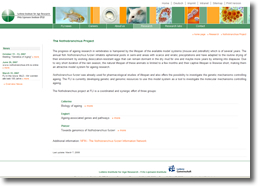The project Innovative model for ageing research: Genome analysis and mutagenesis of the most short-lived known vertebrate (Nothobranchius furzeri) is specially funded by the Leibniz Association and officially starts in January 2006.
N. furzeri is domiciled in East-Zimbabwe and Mozambique and is adapted to surviving in seasonal waters. With a life span of only 12 weeks it is the most short-lived vertebrate known.
The aim of the project is to identify genes that influence the life span of these vertebrates. In order to achieve this, the two FLI research groups Platzer and Englert have teamed up to combine their respective expertise in genome analysis and molecular genetics. This project is significantly supported by the recruitment of A. Celerino (Pisa University), who contributes long-time experience with this model organism and the collaboration with Professor M. Schartl (Würzburg University).









